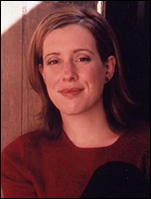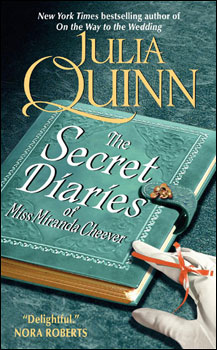 In honor of the release of her 19th full-length novel WHAT HAPPENS IN LONDON tomorrow, Tuesday, July 30, the amazing JULIA QUINN is giving away TWO fantabulous prize packs: one book from her backlist, one collectible Bridgerton bookmark, and two extremely RARE coverflats. This is one contest you do not want to miss. In addition, TWO runners-up will receive one collectible Bridgerton bookmark each.
In honor of the release of her 19th full-length novel WHAT HAPPENS IN LONDON tomorrow, Tuesday, July 30, the amazing JULIA QUINN is giving away TWO fantabulous prize packs: one book from her backlist, one collectible Bridgerton bookmark, and two extremely RARE coverflats. This is one contest you do not want to miss. In addition, TWO runners-up will receive one collectible Bridgerton bookmark each.Comment here on this blog till Tuesday, July 30, midnight U.S.P.T., and Ms. Random Selector will choose the four winners whose names will be posted early Wednesday morning.
 What is it about JQ's books that we all love so much? Is it the humor? The crackling dialogue? The warm and wonderful people in her stories? The hard, realistic problems that they overcome? The message of hope that people from all walks of life with all sorts of issues can find the Holy Grail: true love? The answer for me is—definitely all of the above. What about you? Why are you such a great fan of hers?
What is it about JQ's books that we all love so much? Is it the humor? The crackling dialogue? The warm and wonderful people in her stories? The hard, realistic problems that they overcome? The message of hope that people from all walks of life with all sorts of issues can find the Holy Grail: true love? The answer for me is—definitely all of the above. What about you? Why are you such a great fan of hers? What Happens in London follows on the heels of JQ's first manuscript, published in 2007 and winning the RITA in 2008, The Secret Diaries of Miss Miranda Cheever. Have any one of you not read Diaries? If so, you're in for a real back-to-back treat.
What Happens in London follows on the heels of JQ's first manuscript, published in 2007 and winning the RITA in 2008, The Secret Diaries of Miss Miranda Cheever. Have any one of you not read Diaries? If so, you're in for a real back-to-back treat.Those of who've read Diaries, did you think JQ would write Olivia Bevelstoke's story next? As the hero's sister, Olivia was present throughout the first book, subtly adding tension where needed, dialing it down for the heroine where necessary, and tweaking her brother's manner in dire circumstances. I remember being vaguely disatisfied at the end of Diaries that there was no indication of a possible future HEA for Olivia. So, of course, when JQ first announced the opening and closing lines of Olivia's story, there was the first glimpse of her hero Harry and her naughtiness at the end.
 JQ then proceeded to tantalize us with back cover copy lines, such as: "When Olivia Bevelstoke is told that her new neighbor may have killed his fiancée, she doesn't believe it for a second, but still, how can she help spying on him, just to be sure?" and "Sir Harry Valentine works for the boring branch of the War Office, translating documents vital to national security. He's not a spy, but he's had all the training, and when a gorgeous blonde begins to watch him from her window, he is instantly suspicious." What sort of personality impressions did you form of Harry and Olivia from those two lines and then this back cover copy?
JQ then proceeded to tantalize us with back cover copy lines, such as: "When Olivia Bevelstoke is told that her new neighbor may have killed his fiancée, she doesn't believe it for a second, but still, how can she help spying on him, just to be sure?" and "Sir Harry Valentine works for the boring branch of the War Office, translating documents vital to national security. He's not a spy, but he's had all the training, and when a gorgeous blonde begins to watch him from her window, he is instantly suspicious." What sort of personality impressions did you form of Harry and Olivia from those two lines and then this back cover copy? How was your opinion changed by: this book video trailer, or this soundtrack, or the first chapter?
I didn't have an image for Olivia, she was a bit amorphous from Diaries, but then I saw the trailer. Now, the actress Talia is Olivia in my mind, and I'm rooting for Talia's HEA. (More of my thoughts about JQ's book trailer here.)
As a rough guide to finding kinks in distribution channels, when and where did you pick up your copy of London, if you were able to find it? I was lucky that my Target tends to stock a little, ahem, early (Saturday before). My eyes saw the red cover, my hands shot out and picked up a copy, and my brain just went, "Of course! Gotta have it!" Unfortunately, the area Barnes & Noble are always late with the mass market paperbacks even for mega bestselling local writers like JQ. So on Tuesday, I'll do my bit: Tool around to the stores, drop off a couple Bridgerton bookmarks, and remind them to stock the shelves.
[Video and images are copyrighted by Julia Quinn.]

 My hometown Seattle is known for its evergreen trees, majestic mountains, temperate rainforests, wilderness backpacking abundance, eleven months of rain, grunge music, plethora of vegan/vegetarian/organic choices, software nerds, our very own Fremont Troll, mind-numbing public transportation battles, and excruciating politcal correctness.
My hometown Seattle is known for its evergreen trees, majestic mountains, temperate rainforests, wilderness backpacking abundance, eleven months of rain, grunge music, plethora of vegan/vegetarian/organic choices, software nerds, our very own Fremont Troll, mind-numbing public transportation battles, and excruciating politcal correctness.
 Henry David Thoreau once said: "I have three chairs in my house: one for solitude, two for friendship, three for society." Well, in Seattle, we have lots of single chairs. In his Myth of Seattle Nice, Knute Berger of crosscut.com writes: "We're friendly, but not so friendly as to actually want to get to know each other very much. Being too friendly could result in a restraining order."
Henry David Thoreau once said: "I have three chairs in my house: one for solitude, two for friendship, three for society." Well, in Seattle, we have lots of single chairs. In his Myth of Seattle Nice, Knute Berger of crosscut.com writes: "We're friendly, but not so friendly as to actually want to get to know each other very much. Being too friendly could result in a restraining order."  If you value your life, don't you dare ever say: Recycling's a hassle. Be prepared to sort your trash 37 different ways and do it with a sun-break of a smile, otherwise you stand of being accused of planetary death.
If you value your life, don't you dare ever say: Recycling's a hassle. Be prepared to sort your trash 37 different ways and do it with a sun-break of a smile, otherwise you stand of being accused of planetary death. Bellevue might be an up and coming smartly planned city, according to national urban planners, but to Seattleites, it's nothing but that gas-guzzling, environment-killing suburban sprawl on the other side of Lake Washington. (Albeit with a great mall, not that anyone would admit it.)
Bellevue might be an up and coming smartly planned city, according to national urban planners, but to Seattleites, it's nothing but that gas-guzzling, environment-killing suburban sprawl on the other side of Lake Washington. (Albeit with a great mall, not that anyone would admit it.) You like driving more than biking? What is it with you and the destruction of Mother Earth? Cars aren't meant to be washed, waxed, enjoyed, or shown off. Oil changes and emissions control are performed on the pain of death. Cycling is good for you—leads to weight loss, thereby reducing the burden on the Good Ship Earth. Besides, "if you have a coronary riding up a hill," says Berger, "be reassured that Seattle is the 'Best Place to Have a Heart Attack' according to the Journal of the American Medical Association. So bike it and like it."
You like driving more than biking? What is it with you and the destruction of Mother Earth? Cars aren't meant to be washed, waxed, enjoyed, or shown off. Oil changes and emissions control are performed on the pain of death. Cycling is good for you—leads to weight loss, thereby reducing the burden on the Good Ship Earth. Besides, "if you have a coronary riding up a hill," says Berger, "be reassured that Seattle is the 'Best Place to Have a Heart Attack' according to the Journal of the American Medical Association. So bike it and like it." In our lauded city, pets are people, too, even if they go on your shoe while clogging up your sinuses and scaring your child into a crying jag. So be mindful—in fact, this makes a good slogan for the city: Be mindful of everything no matter how transitory or miniscule—that the frou-frou doggie under your table on your feet could be a lawsuit waiting to happen if you open your mouth to complain.
In our lauded city, pets are people, too, even if they go on your shoe while clogging up your sinuses and scaring your child into a crying jag. So be mindful—in fact, this makes a good slogan for the city: Be mindful of everything no matter how transitory or miniscule—that the frou-frou doggie under your table on your feet could be a lawsuit waiting to happen if you open your mouth to complain.